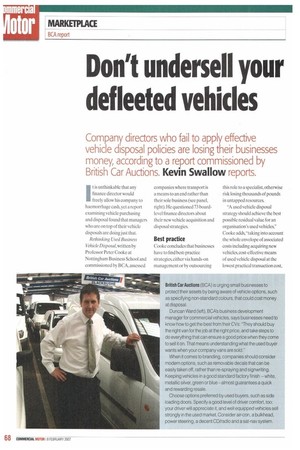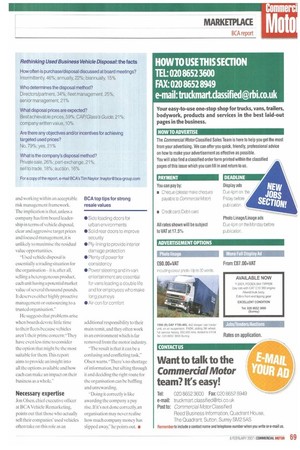Don't undersell your &fleeted vehicles
Page 70

Page 71

If you've noticed an error in this article please click here to report it so we can fix it.
Company directors who fail to apply effective vehicle disposal policies are losing their businesses
money, according to a report commissioned by
British Car Auctions. Kevin Swallow reports.
It is unthinkable that any finance director would freely allow his company to haemorrhage cash, yet a report examining vehicle purchasing and disposal found that managers who are on top of their vehicle disposals are doing just that.
Rethinking Used Business Vehicle Disposal, written by Professor Peter Cooke at Nottingham Business School and commissioned by BCA, assessed companies where transport is a means to an end rather than their sole business (see panel, right). He questioned 73 boardlevel finance directors about their new vehicle acquisition and disposal strategies.
Best pradice
Cooke concludes that businesses have to find best-practice strategies, either via hands-on management or by outsourcing this role to a specialist, otherwise risk losing thousands of pounds in untapped resources.
"A used vehicle disposal strategy should achieve the best possible residual value for an organisation's used vehicles," Cooke adds," taking into account the whole envelope of associated costs including acquiring new vehicles,cost-effective means of used vehicle disposal at the lowest practical transaction cost, and working within an acceptable risk management framework. The implication is that, unless a company has firm board leadership in terms of vehicle disposal, clear and aggressive target prices and focused management, it is unlikely to maximise the residual value opportunities, "Used vehicle disposal is essentially a trading situation for the organisation it is, after all, selling a heterogeneous product, each unit having a potential market value of several thousand pounds. It deserves either highly proactive management or outsourcing to a trusted organisation."
Ele suggests that problems arise when boards devote little time to their fleets because vehicles aren't their prime concern:"They have even less time to consider the option that might be the most suitable for them.This report aims to provide an insight into all the options available and how each can make an impact on their business as a whole."
Necessary expertise
Jon Olsen, chief executive officer at BCA Vehicle Remarketing, points out that those who actually sell their companies' used vehicles often take on this role as an • Side loading doors for urban envlronments • Solid rear doors to improve security • Ply-lining to provide interior damage protection • Plenty of power for consistency • Power steering and in-van entertainment are essential for vans leading a double life and for employees who make long journeys • Air-con for comfort additional responsibility to their main remit, and they often work in an environment which is far removed from the motor industry.
"The result is that it can be a confusing and conflicting task," Olsen warns."There's no shortage of information, but sifting through it and deciding the right route for the organisation can be baffling and unrewarding.
Doing it correctly is like awarding the company a pay rise. If it's not done correctly, an organisation may never realise how much company money has slipped away," he points out. •


























































































































































































